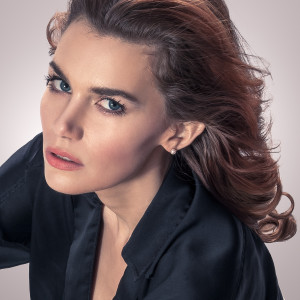- Calls to this hotline are currently being directed to Within Health, Fay or Eating Disorder Solutions
- Representatives are standing by 24/7 to help answer your questions
- All calls are confidential and HIPAA compliant
- There is no obligation or cost to call
- Eating Disorder Hope does not receive any commissions or fees dependent upon which provider you select
- Additional treatment providers are located on our directory or samhsa.gov
Nikki DuBose’s Eating Disorder & Addiction Story

Nikki DuBose’s Eating Disorder & Addiction Story – Insights Into My Memoir
In 2017, I noticed that eating disorders get lost in our political climate. So, I’d like to start by stating that, to all of you out there who are struggling, I want you to know there is hope, strength, that you are loved, and you matter.
My memoir is called “Washed Away: From Darkness to Light” and was released last year in the U.S.
I was a model who had literally spent my entire life trying to be someone. I thought I had to be someone in order to be valuable. That thought came as a result of the trauma that I experienced and led to this constant feeling that I had to be this perfect person.
In my modeling career, I always had expectations put on me to be thinner, prettier, get plastic surgery. All of that combined with my body dysmorphia and got to the point where I nearly died in 2012.
At that time, my mother died from addiction, and I left my modeling career.
That completely changed me. I had to leave behind this identity that I had created for myself.
A lot of us aren’t models but we might look up to models, celebrities, sports stars, dancers, etc.
But, there comes a time in our lives when we have to step away from the identity that we’ve created and do some self-reflection.
When I did that, I realized that my eating disorder was also a false identity for me. It was a comfort for me.
I want to emphasize, eating disorders are not choices. I didn’t choose to have one.
Eating disorders are also layered, so, a component of mine was that it became like an addiction for me.
There was also an environmental factor in my modeling career that a particular appearance was pressured upon me to, to look the thinnest and be the best.
I realized that my eating disorder was an identity that I had to let go of if I wanted to get better and to find out who I really was. I had to change a lot.
I had to leave behind friends that were enabling me to be sick in my mind, my spirit, and my body.
Now, I often talk to young people and those that are homeless about identity and how our identity is linked to our mental illness.
There are so many people that, again, look up to models and celebrities but don’t realize that we’re not perfect. Usually, it is the total opposite, with all of the pressure to look and behave a certain way, many in the public eye struggle with mental illness because we aren’t being true to ourselves. We’re being pressured to do very harmful things to our bodies to maintain that image of “perfection.”
To young people, I always ask, “what is your motivation to get into the modeling industry?” Is it is to be a famous person and be seen or to have success and money, all things that you cannot take with you when you die?
All of those superficial things have a very high cost attached to them and, for me, that cost was my mental health.
So, “Washed Away” is really about my road of suffering. I was very raw and honest about that and don’t regret being that open because I wanted people to understand what it is like to have a mental illness.
I didn’t want to sugarcoat, and I didn’t want to dance around any issue.
Eating disorders, depression, and trauma get hidden or minimized and then we don’t understand the severity of it. Yet, as we know, anorexia nervosa has the highest mortality rate of any mental illness.
We did a research study with Harvard University last year, and we were working to try to regulate the modeling industry.
The study found that 40% of models have an eating disorder. That’s a very high percentage in that one collective study.
Young people will write to me and send me letters saying they think it is important that we have healthier standards in the modeling industry because they feel they are being mentally affected by this image that they see.
So, it isn’t simply about the fashion industry, and it isn’t a superficial issue.

This is about young boys and girls, sitting at home, feeling like they don’t matter or feeling like they’re fat. They have low self-esteem and body dissatisfaction because, when they flip on the television or open a magazine, they see someone who looks amazing.
But, this person is working in an industry that is pressuring them to be unhealthy. It is a negative cycle.
Another aspect I touch on in my book was the trauma I experienced, which was child abuse.
Child abuse has a very high correlation with eating disorders because, when you have a negative situation or something terrible happens to you, you start to internalize those feelings.
My situation was with my mother and a family relative, and it led to me thinking “why don’t these people love me?”
I would ask myself “what is going on here?”
I could feel, even at a very young age, that there was an imbalance in my environment.
With this experience and those feelings, my physiological and mental response was to hate myself.
There are so many topics I touch on in my book that are very important and issues with which millions of people in the United States are struggling.
It is my hope that my book can be a valuable resource to those people.
Read more: About Nikki DuBose
Source:
Virtual Presentation by Nikki DuBose in the Dec. 7, 2017 Eating Disorder Hope Inaugural Online Conference & link to the press release at https://www.prnewswire.com/news-releases/eating-disorder-hope-offers-inaugural-online-conference-300550890.html

About the Presenter: Nikki DuBose is a model, author, and advocate. She is the Co-Founder of The Artists League for Change, a national nonprofit dedicated to preventing mental health issues and abuse through the creative arts, and is an Ambassador for the Shaw Mind Foundation. Her debut memoir, Washed Away: From Darkness to Light, was released September 30, 2016, in the U.S. and will be released in French in 2018 with Editions du Rocher.
Nikki has been featured on television shows and networks such as The Doctors, TD Jakes, CBS Los Angeles, and the Oprah Winfrey Network, and profiled in publications such as People, LA Times, and Vogue UK. She worked alongside Assemblymember Marc Levine on California Assembly Bill 2539, which addressed the need for workplace protections and health standards in the modeling industry. She gives talks regularly on her recovery at universities and treatment centers and writes extensively on mental health, political issues, and the modeling industry on the NY Daily News, The Huffington Post, PsychCentral, and more.
Nikki contributed as an expert reviewer for Harvard University’s STRIPED program (Strategic Training Initiative for the Prevention of Eating Disorders), helping craft their student and teaching lesson for the fall 2016 semester, which focused on modeling and eating disorders.

About the Transcript Editor: Margot Rittenhouse is a therapist who is passionate about providing mental health support to all in need and has worked with clients with substance abuse issues, eating disorders, domestic violence victims, and offenders, and severely mentally ill youth.
As a freelance writer for Eating Disorder and Addiction Hope and a mentor with MentorConnect, Margot is a passionate eating disorder advocate, committed to de-stigmatizing these illnesses while showing support for those struggling through mentoring, writing, and volunteering. Margot has a Master’s of Science in Clinical Mental Health Counseling from Johns Hopkins University.
The opinions and views of our guest contributors are shared to provide a broad perspective of eating disorders. These are not necessarily the views of Eating Disorder Hope, but an effort to offer a discussion of various issues by different concerned individuals.
We at Eating Disorder Hope understand that eating disorders result from a combination of environmental and genetic factors. If you or a loved one are suffering from an eating disorder, please know that there is hope for you, and seek immediate professional help.
Published on June 26, 2018.
Reviewed on June 26, 2018 by Jacquelyn Ekern, MS, LPC.

The EatingDisorderHope.com editorial team comprises experienced writers, editors, and medical reviewers specializing in eating disorders, treatment, and mental and behavioral health.

